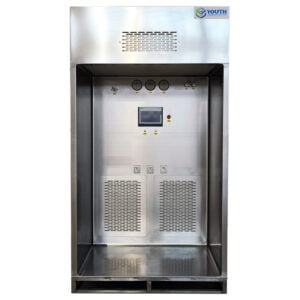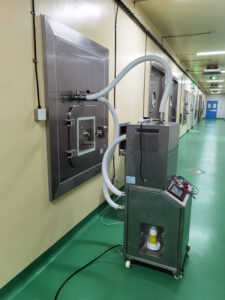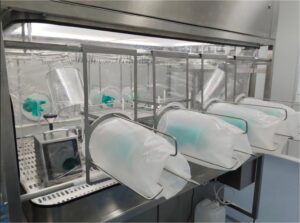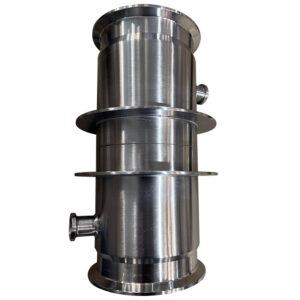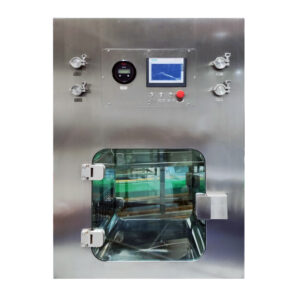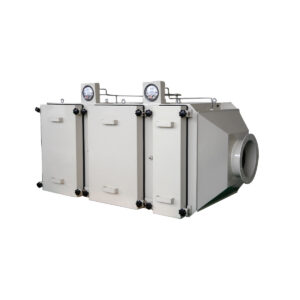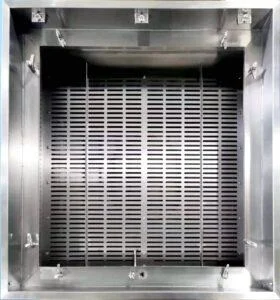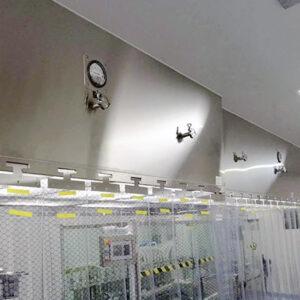In an era where clean energy solutions are increasingly sought after, hydrogen generators have emerged as a promising technology. These devices, designed to produce hydrogen gas on-demand, have garnered attention for their potential to revolutionize various industries and contribute to a greener future. But do hydrogen generators really work as claimed?
Hydrogen generators have been touted as efficient, cost-effective, and environmentally friendly alternatives to traditional gas supply methods. They operate by splitting water molecules into hydrogen and oxygen through a process called electrolysis, providing a continuous supply of high-purity hydrogen gas. While the technology has shown promise in laboratory settings and industrial applications, questions remain about its practicality, efficiency, and overall effectiveness in real-world scenarios.
As we delve deeper into the world of hydrogen generators, we'll explore their functionality, applications, and potential impact on various sectors. From examining the underlying science to analyzing their economic viability, this article aims to provide a comprehensive understanding of hydrogen generators and their place in our energy landscape.
Hydrogen generators have demonstrated their ability to produce high-purity hydrogen gas on-demand, offering a potential solution for various industries seeking clean energy alternatives.
| Aspect | Hydrogen Generators | Traditional Gas Cylinders |
|---|---|---|
| Safety | Lower risk, no high-pressure storage | Higher risk due to high-pressure storage |
| Supply | On-demand production | Limited by cylinder capacity |
| Purity | Consistent high purity | Purity may vary between cylinders |
| Cost | Higher initial investment, lower long-term costs | Lower initial cost, higher long-term expenses |
| Environmental Impact | Potentially lower carbon footprint | Higher carbon footprint due to transportation |
How do hydrogen generators work?
Hydrogen generators operate on a relatively simple principle, but their implementation involves sophisticated technology. At the core of these devices is the process of electrolysis, which uses electricity to split water molecules into hydrogen and oxygen. But how exactly does this process unfold, and what makes it an effective method for hydrogen production?
The electrolysis process in hydrogen generators typically involves passing an electric current through water that has been treated with an electrolyte to improve conductivity. This current breaks the bonds between hydrogen and oxygen atoms in the water molecules, allowing them to be separated and collected. The resulting hydrogen gas is then purified and compressed for use or storage.
One of the key advantages of hydrogen generators is their ability to produce hydrogen on-demand, eliminating the need for storage and transportation of large quantities of gas. This not only enhances safety but also ensures a consistent supply of high-purity hydrogen for various applications.
Modern hydrogen generators can achieve efficiencies of up to 80% in converting electrical energy into hydrogen, making them a potentially viable option for clean energy production.
| Component | Function |
|---|---|
| Electrolysis Cell | Splits water into hydrogen and oxygen |
| Power Supply | Provides electricity for the electrolysis process |
| Water Treatment System | Purifies water and adds electrolyte |
| Gas Purification System | Ensures high-purity hydrogen output |
| Control System | Monitors and regulates the production process |
Are hydrogen generators safe to use?
Safety is a paramount concern when dealing with any form of energy production, and hydrogen generators are no exception. Given hydrogen's flammable nature, it's natural to question the safety of devices designed to produce this gas. So, how do hydrogen generators measure up in terms of safety?
Hydrogen generators incorporate several safety features designed to minimize risks associated with hydrogen production and use. These include pressure relief valves, leak detection systems, and automatic shut-off mechanisms. Additionally, because hydrogen is produced on-demand and in small quantities, the risk of large-scale leaks or explosions is significantly reduced compared to traditional high-pressure storage methods.
Despite these safety measures, it's crucial to note that proper installation, maintenance, and operation of hydrogen generators are essential for ensuring their safe use. Users must be trained in the correct handling procedures and adhere to all safety guidelines provided by manufacturers.
When properly installed and operated, hydrogen generators have been shown to have an excellent safety record, with incidents being rare and typically minor in nature.
| Safety Feature | Purpose |
|---|---|
| Leak Detection | Identifies hydrogen leaks early |
| Pressure Relief | Prevents dangerous pressure buildup |
| Automatic Shutdown | Stops production in case of malfunction |
| Ventilation Systems | Ensures proper dispersion of any leaked gas |
| Flame Arrestors | Prevents flame propagation in case of ignition |
What are the applications of hydrogen generators?
Hydrogen generators have found their way into a diverse range of applications, spanning from industrial processes to cutting-edge research. But what specific roles do these devices play, and how are they contributing to advancements in various fields?
In the industrial sector, hydrogen generators are used for metal heat treatment, glass manufacturing, and semiconductor production. They provide a reliable source of high-purity hydrogen necessary for these processes. In the field of energy, hydrogen generators are being explored as a means of storing renewable energy, with excess electricity from solar or wind sources used to produce hydrogen for later use.
Research laboratories, particularly those involved in chromatography and mass spectrometry, rely on hydrogen generators for a consistent supply of carrier gas. The [' YOUTH '] portable decontamination VHP generator unit, for instance, demonstrates how hydrogen-based technologies can be applied in cleanroom and biosafety settings.
Hydrogen generators have proven particularly effective in laboratory settings, where they provide a safer, more convenient, and often more economical alternative to high-pressure gas cylinders.
| Application | Benefit of Hydrogen Generators |
|---|---|
| Industrial Processes | Consistent supply of high-purity hydrogen |
| Energy Storage | Potential for storing renewable energy |
| Laboratory Research | On-demand gas supply, improved safety |
| Fuel Cell Technology | Clean hydrogen production for fuel cells |
| Food Processing | Hydrogenation processes in food industry |
How cost-effective are hydrogen generators?
The economic viability of hydrogen generators is a crucial factor in determining their widespread adoption. While the initial investment in a hydrogen generator can be substantial, the long-term cost savings potential is significant. But how do the numbers stack up when compared to traditional hydrogen supply methods?
The cost-effectiveness of hydrogen generators largely depends on the scale of hydrogen consumption and the local prices of electricity and water. For many applications, particularly those requiring a consistent supply of high-purity hydrogen, generators can offer substantial savings over time. They eliminate the need for frequent cylinder replacements, reduce transportation costs, and minimize downtime associated with gas supply changes.
However, it's important to consider factors such as maintenance costs, electricity consumption, and the lifespan of the equipment when evaluating the overall cost-effectiveness. For some low-volume users, traditional gas cylinders might still be more economical.
Studies have shown that for medium to high-volume hydrogen users, generators can reduce gas costs by up to 50% over a five-year period compared to cylinder supply.
| Cost Factor | Hydrogen Generators | Gas Cylinders |
|---|---|---|
| Initial Investment | High | Low |
| Ongoing Costs | Electricity, water, maintenance | Regular cylinder purchases, delivery fees |
| Labor Costs | Minimal | Higher due to cylinder handling |
| Downtime Costs | Minimal | Potential delays during cylinder changes |
| Long-term Savings | Potentially significant | Limited |
What is the environmental impact of hydrogen generators?
As the world grapples with the urgent need to reduce carbon emissions, the environmental impact of energy production methods is under intense scrutiny. Hydrogen generators, often touted as a clean energy solution, warrant a closer look at their ecological footprint. But how green are these devices really?
The environmental impact of hydrogen generators largely depends on the source of electricity used to power them. When powered by renewable energy sources such as solar or wind, hydrogen generators can produce hydrogen with minimal carbon emissions. This "green hydrogen" has the potential to play a significant role in decarbonizing various industries and transportation sectors.
However, if the electricity used comes from fossil fuel sources, the overall environmental benefit is reduced. It's also important to consider the environmental impact of manufacturing the generators themselves and the water consumption involved in the hydrogen production process.
When powered by renewable energy, hydrogen generators can produce hydrogen with up to 90% lower carbon emissions compared to traditional fossil fuel-based hydrogen production methods.
| Environmental Aspect | Impact of Hydrogen Generators |
|---|---|
| Carbon Emissions | Depends on electricity source |
| Water Consumption | Moderate, with potential for recycling |
| Resource Use | Requires rare metals for catalysts |
| Waste Production | Minimal during operation |
| Land Use | Smaller footprint compared to large-scale hydrogen production |
How reliable are hydrogen generators?
Reliability is a critical factor for any technology, especially one that aims to provide a consistent supply of an essential resource like hydrogen. But how do hydrogen generators measure up in terms of dependability and consistent performance?
Modern hydrogen generators are designed for continuous operation with minimal downtime. They typically feature robust construction and advanced control systems that monitor and adjust the production process to maintain optimal performance. Many models are capable of running 24/7, providing a reliable source of hydrogen on demand.
However, like any mechanical system, hydrogen generators require regular maintenance to ensure continued reliable operation. This includes periodic replacement of filters, membranes, and other consumable components. The frequency and complexity of maintenance can vary depending on the specific model and usage patterns.
Well-maintained hydrogen generators have been shown to achieve uptime rates of over 99%, providing a highly reliable source of hydrogen for critical applications.
| Reliability Factor | Performance of Hydrogen Generators |
|---|---|
| Uptime | Typically >99% with proper maintenance |
| Consistency | Stable gas purity and flow rate |
| Durability | Designed for continuous operation |
| Maintenance Needs | Regular but generally straightforward |
| Lifespan | Often 10+ years with proper care |
What advancements are being made in hydrogen generator technology?
The field of hydrogen generation is rapidly evolving, with ongoing research and development aimed at improving efficiency, reducing costs, and expanding applications. What are the latest advancements in hydrogen generator technology, and how might they shape the future of this industry?
Recent innovations have focused on enhancing the efficiency of the electrolysis process, with new catalyst materials and cell designs showing promise in reducing energy consumption. Researchers are also exploring alternative methods of hydrogen production, such as high-temperature electrolysis and photoelectrochemical water splitting, which could potentially offer even greater efficiencies.
Efforts are also underway to develop more compact and scalable hydrogen generator designs, making the technology more accessible for a wider range of applications. This includes the development of modular systems that can be easily scaled up or down to meet varying hydrogen demands.
Recent advancements in electrolysis technology have demonstrated the potential to increase hydrogen production efficiency by up to 30%, significantly improving the economic viability of hydrogen generators.
| Area of Advancement | Potential Impact |
|---|---|
| Catalyst Materials | Improved efficiency, reduced costs |
| Cell Design | Higher production rates, better durability |
| Control Systems | Enhanced safety, optimized performance |
| Alternative Production Methods | Potential for breakthrough efficiencies |
| Scalability | Wider range of applications |
In conclusion, hydrogen generators have demonstrated their ability to produce clean, high-purity hydrogen gas on-demand, offering a viable alternative to traditional gas supply methods in many applications. While challenges remain, particularly in terms of cost and large-scale implementation, ongoing advancements in the technology are continually improving their efficiency, reliability, and environmental performance.
The effectiveness of hydrogen generators is evident in their growing adoption across various industries, from laboratory research to industrial processes. Their ability to provide a consistent, safe, and potentially more economical hydrogen supply makes them an attractive option for many users. Moreover, when powered by renewable energy sources, hydrogen generators have the potential to play a significant role in the transition to a cleaner energy future.
However, it's important to recognize that the viability of hydrogen generators can vary depending on specific applications, scale of use, and local energy costs. As with any technology, careful consideration of individual needs and circumstances is crucial when evaluating their implementation.
As research and development in this field continue, we can expect further improvements in hydrogen generator technology, potentially opening up new applications and enhancing their overall effectiveness. While challenges remain, the progress made thus far suggests that hydrogen generators will likely play an increasingly important role in our energy landscape moving forward.
External Resources
Cost-Benefit Analysis: Hydrogen Generators vs. Gas Cylinders – This article provides a detailed cost-benefit analysis of hydrogen generators compared to traditional gas cylinders, highlighting the economic, operational, safety, and environmental benefits of using hydrogen generators.
Hydrogen generation for a cleaner future – This article discusses the efficiency and advantages of hydrogen generators, particularly the Element 1 technology, which uses a thermochemical process to generate hydrogen with high energy efficiency and lower environmental impact.
How does a Hydrogen gas generator work? – This article explains the operation of hydrogen gas generators, their safety features, and the benefits they offer over traditional high-pressure cylinders, including consistent gas purity, on-demand production, and reduced carbon footprint.
Common Myths About Hydrogen Generators – This article dispels common myths about hydrogen generators, addressing concerns about safety, cost-effectiveness, maintenance, and water consumption, providing a clearer understanding of their true capabilities and benefits.
Facts about hydrogen generators, HHO cell design, dry cell, Brown's … – Although focused on HHO generators for automotive use, this resource provides insights into the basic principles of hydrogen generation, efficiency, and safety considerations, which can be relevant for understanding broader applications.
Hydrogen Generators for Laboratories – This resource from Peak Scientific highlights the benefits of using hydrogen generators in laboratory settings, including continuous gas supply, reduced cylinder handling, and enhanced safety features.
Related Contents:
- Unlocking the Power of Hydrogen: Do Generators Really Work?
- Unlocking the Power of Hydrogen Water Generators
- Powering Our World: The Inner Workings of Generators
- Unleashing the Power of Bioquell VHP Generators
- STERIS VHP Generators: Advanced Decontamination Solutions
- Vaporized Hydrogen Peroxide Generators: Revolutionizing Decontamination
- VHP Generators: Revolutionizing Decontamination in Cleanrooms
- The Power of VHP Generators: Revolutionizing Decontamination
- Portable VHP Generators: Revolutionizing Sterilization









